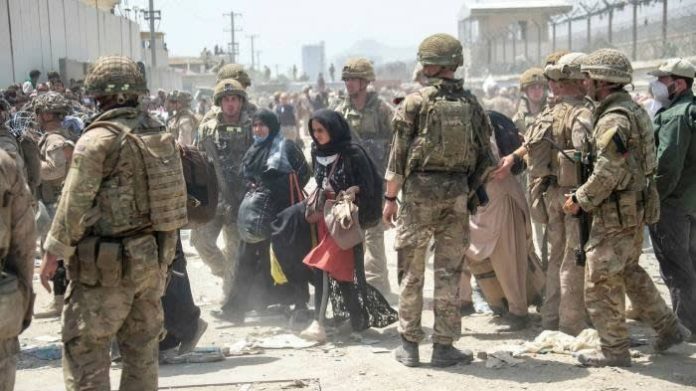Global Economy updates
Sign up to myFT Daily Digest to be the first to know about Global Economy news.
Good morning. This article is an on-site version of our FirstFT newsletter. Sign up to our Asia, Europe/Africa or Americas edition to get it sent straight to your inbox every weekday morning. You can reach us at firstft@ft.com
The Pentagon said it had ordered US civilian airlines to help move Afghan refugees out of US bases in the Middle East, as western forces struggled to evacuate people from the country a week after the Taliban retook control.
Lloyd Austin, US defence secretary, activated the Civil Reserve Air Fleet to provide commercial aircraft in support of evacuation efforts from temporary havens, allowing military planes to focus on flying in and out of Kabul’s international airport.
US carriers including American Airlines, Atlas Air, Delta, United, Omni Air and Hawaiian Airlines will provide a combined total of 18 aircraft, the Pentagon said.
Thousands of Afghans wanting to leave the country were still crowded around Kabul’s international airport yesterday, but were unable to enter the area controlled by US forces. A Nato official said that at least 20 people had died in and around the airport over the past seven days.
-
What has changed in two decades? Since the Taliban lost control in 2001, fertility rates fell, education of women increased and mobile phone subscriptions soared. Here are 10 charts that show how living conditions have improved in Afghanistan.
“The female voices that have flourished over the past 20 years must still be celebrated,” writes Enuma Okoro. Follow the latest news on Afghanistan at FT.com.
Five more stories in the news
1. Swedish prime minister to step down in November Stefan Lofven has unexpectedly announced that he will step down in three months, generating political turmoil ahead of elections next year. Lofven has dealt with two big crises during his seven years in office — the 2015 refugee flows and the Covid-19 pandemic, during which Sweden’s lack of a formal lockdown made it an outlier.
2. Merkel addresses Ukrainian concerns over Nord Stream 2 The pipeline, which will pump Russian gas to western Europe across the Baltic Sea, is of particular concern to Kyiv, which stands to lose $2bn in transit revenues if Moscow cuts supplies through Ukraine. “We are for new sanctions if Russia uses this gas pipeline as a weapon,” told the German chancellor to the Ukrainian president.
3. England to turn to China and Russia Boris Johnson wants to focus on a longer-term approach to the Afghan crisis and acknowledges that following the US retreat, China and Russia are now significant players in the region. As chair of the G7, the UK prime minister will hold talks that will include evacuation arrangements for western nationals and Afghan citizens.
4. UK rejects industry plea for visas for EU truck drivers Ministers have rejected industry calls to allow EU migrants to fill the large gap in the UK labour market for lorry drivers. However, the UK government is willing to look at increasing training of Britons wanting to be hauliers.
5. Climate models forecast more frequent extreme heat Heatwaves will become longer and more intense if greenhouse gas emissions continue to grow. The impact might be particularly evident in the southern hemisphere, new modelling shows.
-
Read more: Humanity stands on the brink of disaster. But with creative thinking and collective will, we may still have time to avert catastrophe, writes Kim Stanley Robinson.

Coronavirus digest
-
AstraZeneca will move to seek regulatory approval of its antibody cocktail after a study showed the drug significantly reduced the risk of developing symptomatic Covid-19.
-
Cinemas are pinning hopes for recovery from an “existential” crisis on a slate of Covid-delayed blockbusters, such as the latest James Bond film.
-
Global stocks recorded their worst week since June as fears of a slower economic rebound and a looming reduction in US stimulus weighed heavily on sentiment.

Tim Harford asks: are Covid-19 regulations here to stay? Sign up here for our Coronavirus Business Update newsletter.
The day ahead
Vaccines All 16 and 17-year-olds are to be offered their first dose of a coronavirus vaccine by today. The UK health secretary Sajid Javid said the date would give teenagers two weeks to build up immunity before school starts.
Kamala Harris The US vice-president arrived in south-east Asia yesterday. Harris will meet the Singapore president and prime minister today, and make a stop at Changi Naval Base. She will seek to strengthen relationships with partners in a region dominated by China’s economic and political influence. (CNN)
What else we’re reading
Taiwanese shrug off China threat Over the past year, China has taken a more belligerent stance on Taiwan, threatening to invade the territory if Taipei refuses indefinitely to submit. Patrols and military exercises have intensified, alarming the US which said that a Chinese attack on Taiwan could be launched within six years. But on the ground in Taiwan, there is no sign of panic.
How US payments groups ended up on the wrong side of India’s plans In India, 20 per cent of the population does not have bank accounts and only 3 per cent have credit cards, creating enormous opportunities for financial services. Indian policymakers have been trying to make the economy less cash-dependent, but strict rules on data storage trip up overseas businesses hoping to expand in a big growth market.
Olympian Krystsina Tsimanouskaya recounts her escape After a dispute with Belarusian sports authorities, officials from the country’s repressive regime tried to bundle the 24-year-old sprinter on a plane back from the Tokyo Olympics. Tsimanouskaya, aided by a translation app, fled Japan to seek refuge in Poland, where she now lives under 24-hour protection. Here is what she told the FT about her escape.
“I was thinking, what should I do if I can’t find the police? Should I tear up my passport? Start running?” she recalls.
High-profile rape allegations revive China’s #MeToo movement An anti-harassment campaign was fading until a pop star and former Alibaba manager were publicly accused. But women’s rights activists warned that the ruling Chinese Communist party remained wary of mass feminist activism, which continues to suffer from censorship and nationalist attacks.
How Myanmar coup fuelled a rise in drugs trade Thai police seized 1,000kg of crystal methamphetamine as officials and analysts watch rising drug trafficking and addiction with alarm. They say the narcotics originated from neighbouring Myanmar, which has spun into political chaos and civil conflict since the military takeover.

Travel
Five aqua-adventures Jaguar spotting on the Peruvian Amazon, heli-skiing in Greenland, extreme fly fishing in Patagonia, or just chilling off Paxos: wherever you do it, do it from a boat.

Recommended newsletters for you
Due Diligence — Top stories from the world of corporate finance. Sign up here
Moral Money — Our unmissable newsletter on socially responsible business, sustainable finance and more. Sign up here
Credit: Source link






























